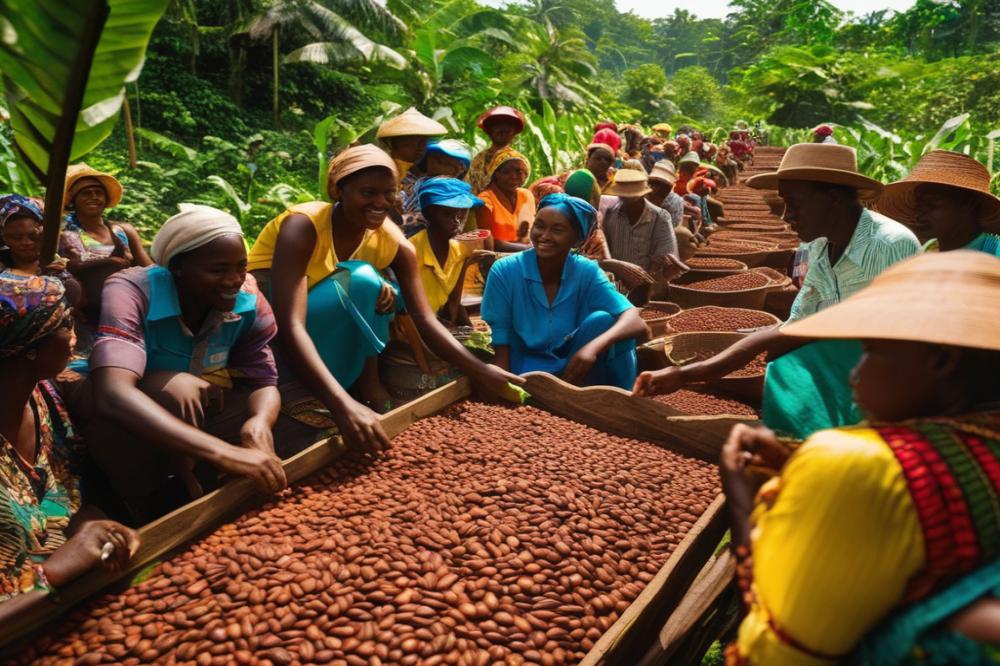Introduction
The chocolate industry plays a significant role in the global economy. Millions of people enjoy its sweet taste, but few know the challenges behind its production. Cocoa farming, primarily in developing countries, is often fraught with issues of poverty and exploitation. A considerable percentage of cocoa farmers struggle to make a living wage. They face hardships that many consumers would find unimaginable.
ethical sourcing refers to the practice of ensuring products are obtained in a way that respects both people and the planet. In the context of chocolate, this means supporting cocoa farmers through fair wages and sustainable farming practices. The goal is to create a system that benefits all parties involved, from the growers to the end consumers.
Fair Trade has emerged as a crucial movement within the chocolate industry. It aims to promote equitable trade and protect the rights of farmers. By opting for fair trade chocolate, consumers support a model that prioritizes economic empowerment and food justice. Certification programs help ensure that products adhere to specific standards, which promotes transparency and accountability in the supply chain.
This article will explore the impact of ethical sourcing on the chocolate industry. We will delve into how fair trade practices affect cocoa farmers, the environment, and communities. Understanding these elements allows consumers to recognize their role in fostering sustainability and social impact through their purchasing choices.
Understanding Ethical Sourcing

Ethical sourcing is a growing movement in the food industry that focuses on how products are made and where they come from. It emphasizes fairness and transparency throughout the supply chain, particularly in industries like chocolate. Consumers are becoming increasingly aware of the choices they make and their impact on the world.
Three key components define this approach: sustainability, equitable trade, and social responsibility. Sustainability involves practices that protect the environment for future generations. Equitable trade ensures that cocoa farmers receive fair wages for their work. Social responsibility refers to the obligations of businesses to contribute positively to communities.
Certification plays a crucial role in verifying that companies adhere to these ethical practices. Recognizable labels like Fair Trade or Rainforest Alliance signal to consumers that products meet specific standards. Such certifications provide reassurance that the products are sourced responsibly.
Consumer demand for ethically sourced products is on the rise. Shoppers are more informed and want to support brands that align with their values. They are looking for items that contribute to food justice and empower those who grow them economically. This shift indicates that people care not just about the taste of chocolate but also about its journey from bean to bar.
The social impact of fair trade chocolate extends beyond simple transactions. Issues like environmental impact and community development come to the forefront. When consumers choose these products, they promote a cycle of ethical consumerism that supports sustainable practices and benefits cocoa farmers around the world.
The Role of Fair Trade in the Chocolate Industry

The story of Fair Trade in chocolate sourcing began in the late 20th century. Initially, the concept emerged in response to the struggles faced by cocoa farmers. Many of these farmers dealt with high levels of poverty and unfair pricing from large companies. In response, organizations started to form, aiming to create change. They focused on developing a certification system that helps consumers identify ethically produced products. Today, Fair Trade chocolate represents a significant part of the market.
Fair Trade practices offer vital support to cocoa farmers. They do this by guaranteeing fair wages and promoting better working conditions. With Fair Trade certification, farmers receive a minimum price for their crops. This price is often higher than what they would get on the open market. As a result, farmers can invest in their farms, education, and health care. These benefits foster economic empowerment, helping farmers build sustainable livelihoods.
Moreover, workers benefit from improved job security and community development. Fair Trade initiatives focus on more than just economic benefits. They also promote social impact by encouraging democratic decision-making within farming communities. Farmers often receive training in sustainable agricultural practices. These practices not only improve crop yields but also reduce the environmental impact of cocoa farming.
The ripple effects of Fair Trade extend into local communities and economies as well. When cocoa farmers prosper, entire communities thrive. High wages lead to better education and health services, which uplift families. Consumers play an important role in this cycle through their choices. By practicing ethical consumerism, they can support fair trade and help create a demand for equitable trade. Supporting Fair Trade chocolate is more than just a purchase; it’s a step toward food justice.
Consumer Responsibility and Ethical Consumerism

Ethical consumerism refers to the practice of purchasing products that align with one’s values, particularly regarding social and environmental issues. It has gained traction in recent years as more people become aware of the power of their choices. This shift highlights how individuals can contribute to sustainability and fairness through their buying habits.
Each time someone chooses to buy fair trade chocolate instead of conventional options, they make a significant decision. These purchases promote sustainable practices and support cocoa farmers who benefit from equitable trade. A small change in personal habits can lead to a larger impact on the community and the environment.
Awareness of social impact plays a critical role in consumer decisions. Many shoppers today actively seek products that are partners in food justice. This growing recognition motivates them to look for certification that guarantees products are sourced ethically and responsibly. Such certifications signal to buyers that they are contributing to economic empowerment for producers.
Various brands have paved the way in this arena. For instance, brands like Divine Chocolate and Alter Eco stand out as leaders in ethical chocolate sourcing. Their commitment to transparency in the supply chain assures consumers that their choices lead to positive changes. By choosing these brands, shoppers are not just satisfying their sweet tooth; they are also supporting farmers who work tirelessly under fair conditions.
Each of these companies illustrates the powerful connection between consumer responsibility and ethical consumerism. Their efforts to support sustainability and minimize environmental impact influence many other businesses to follow suit. As a result, consumers find themselves in a position of power, capable of demanding more from companies that want their business.
Social and Environmental Impact
Ethical sourcing of chocolate significantly impacts the lives of cocoa farmers. Many farmers experience better living conditions due to higher pay from Fair Trade practices. This equitable trade helps lift entire communities out of poverty. As farmers earn more, they can invest in education for their children, improving the future. Access to healthcare also becomes easier, reducing illness and promoting well-being.
Along with social benefits, Fair Trade has substantial environmental advantages. Sustainable farming methods are encouraged in Fair Trade certification. These methods focus on reducing chemical use and protecting biodiversity. For instance, shade-grown cocoa helps preserve trees and habitats, improving air quality and soil health. Furthermore, these practices mitigate climate change effects, making cocoa cultivation more resilient.
A comparison between conventional and Fair Trade chocolate production reveals stark differences. Conventional farming often leads to land degradation. In contrast, Fair Trade promotes sustainable practices that protect the environment. Traditional producers may not prioritize worker welfare or ecological balance, but Fair Trade’s focus on economic empowerment aims to change that. Consumers can feel good knowing their choices support positive change.
Despite its successes, the Fair Trade model faces challenges and criticisms. Some argue that it doesn’t go far enough in addressing food justice issues. Others question whether certification truly impacts farmers’ lives. Critiques often highlight that Fair Trade can raise costs for consumers while not guaranteeing better benefits for farmers. Additionally, the complexity of certification can create barriers for small producers, limiting their access to the market. Navigating these issues requires a deeper understanding of the whole system.
Trends and Innovations in Ethical Sourcing
In recent years, the chocolate industry has seen a shift toward sustainability. Many brands now prioritize methods that promote the welfare of cocoa farmers. They realize that consumers are increasingly interested in the origins of their food. This has led to a rise in products labeled as Fair Trade and organic. These labels signify a commitment to equitable trade practices.
Technological innovations have played a significant role in supporting fair trade practices. Blockchain technology is now being used to trace the supply chain of chocolate. This transparency gives consumers confidence in their purchases. Mobile apps are also helping farmers connect directly with buyers. This connection can lead to better prices and reduce dependency on middlemen.
Collaborations between brands, farmers, and NGOs are becoming more common. These partnerships aim to address issues like poverty and environmental protection. By working together, they can have a larger social impact. Initiatives often focus on economic empowerment for cocoa farmers. Such efforts help improve living conditions and promote community development.
Consumer responsibility is an emerging trend that shapes the market. People are becoming more aware of the impact their choices have on the environment. Ethical consumerism is no longer just a buzzword; it’s a movement. Shoppers are seeking out brands that align with their values. This change is pushing companies to adopt more sustainable practices.
The future of ethical sourcing in chocolate presents certain challenges. Although awareness is growing, not all consumers prioritize sustainability. The price of Fair Trade chocolate can be higher, making it less accessible. Furthermore, the effects of climate change pose a threat to cocoa production. Adapting to these challenges will require cooperation across the industry.
Despite obstacles, the prospects for ethical sourcing remain hopeful. More consumers are recognizing the importance of food justice. They want to support farmers who receive fair payments. The continued demand for sustainable chocolate can drive change in the industry. Efforts to educate consumers are crucial in maintaining momentum.
Final Thoughts on Fair Trade Chocolate
The significance of fair trade in the chocolate industry cannot be overstated. It plays a crucial role in improving the lives of cocoa farmers. They often face challenges like low wages and poor working conditions. By choosing fair trade chocolate, consumers support efforts that advocate for better practices. Each purchase contributes to the well-being of farmers and their families, promoting more equitable trade relationships.
It is essential for consumers to embrace choices that reflect their values. With every bar or box of chocolate bought, there lies an opportunity to make a difference. Educating oneself about where chocolate comes from can lead to more informed purchases. Supporting brands that prioritize fair trade sends a strong message about what matters to shoppers today.
Looking ahead, the impact of fair trade chocolate on the industry shows promise. As more people become aware of ethical sourcing, demand for these products is likely to rise. This shift can lead to more companies opting for fair trade certifications. Thus, a culture of sustainability may flourish, wherein both producers and consumers thrive together.
Maintaining focus on food justice is vital for the future. The journey toward sustainability in the chocolate industry requires ongoing commitment from everyone involved. Together, consumers and producers can work toward a vision where cocoa farmers receive fair compensation and communities flourish. Ultimately, individual choices can lead to greater changes, shaping a fairer world one chocolate purchase at a time.



